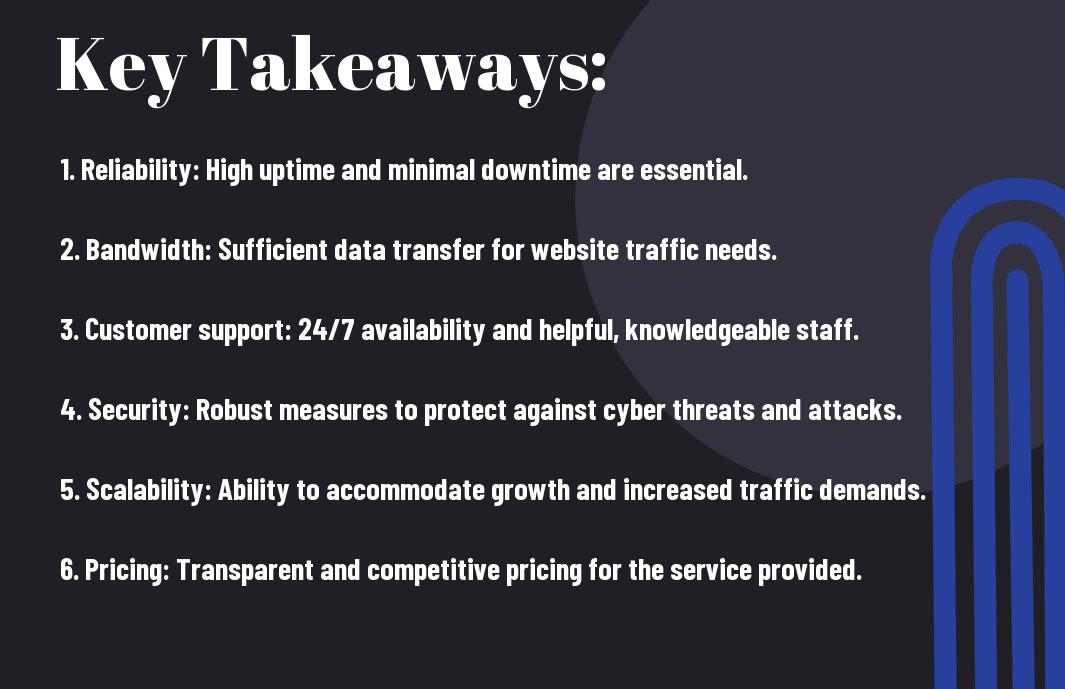When choosing a web hosting service, it is imperative that you carefully consider a few key factors to ensure that your website runs smoothly and efficiently. The right web hosting service can make all the difference in the success of your online presence, while the wrong one can lead to frustration and potential security risks. In this blog post, we will discuss the most important aspects to look for in a web hosting service, including reliability, security, customer support, and scalability. By the end of this post, you will have a clear understanding of what to look for in a web hosting service, and be well-equipped to make an informed decision for your website.
Key Takeaways:
- Reliability: It’s crucial to choose a web hosting service that offers reliable uptime, ensuring your website is always accessible to visitors.
- Security: Look for a hosting provider that prioritizes security measures such as SSL certificates, firewalls, and regular backups to protect your website from cyber threats.
- Customer Support: Opt for a web hosting service that offers 24/7 customer support, as technical issues can arise at any time and prompt assistance is essential.
- Scalability: Consider a hosting service that can accommodate the growth of your website, providing options for upgrading resources as your traffic and content expand.
- Price and Features: Compare the pricing and features offered by different web hosting providers to find the best value for your specific needs, such as storage space, bandwidth, and additional perks like website builders and email hosting.

Core Features of Web Hosting
Obviously, when considering a web hosting service, there are several core features that you need to keep in mind. These are essential for the smooth operation of your website. For a comprehensive guide on what to look for, we recommend checking out 10 Tips for Choosing the Right Web Hosting Company before making a decision.
Types of Web Hosting
When it comes to web hosting, there are several different types available, each with its own set of advantages and limitations. You can choose from options such as shared hosting, VPS hosting, dedicated server hosting, and cloud hosting. Knowing the differences between these types will help you determine which one is most suitable for your website. For a comprehensive comparison, take a look at the following table:
| Type of Hosting | Description |
| Shared Hosting | Multiple websites share the same server resources |
| VPS Hosting | A virtual private server with dedicated resources |
| Dedicated Server Hosting | An entire server dedicated to your website |
| Cloud Hosting | Resources are spread across multiple virtual servers |
Knowing which type of hosting best suits your needs will ensure that you can make an informed decision when choosing a web hosting service.
Bandwidth and Storage Considerations
When selecting a web hosting service, it’s important to consider bandwidth and storage requirements for your website. Bandwidth refers to the amount of data that can be transferred to and from the server, while storage refers to the amount of disk space available to store your website’s files, images, and databases. You need to ensure that your chosen web hosting service offers enough bandwidth and storage to accommodate your website’s needs. Your website’s traffic and the size of your files will determine the amount of bandwidth and storage you require. Be sure to choose a web hosting service that can handle your projected traffic and storage needs to avoid performance issues.
Security and Uptime
Not all web hosting services are created equal when it comes to security and uptime. When choosing a web hosting provider, it’s crucial to consider the security measures they have in place to protect your website and the uptime guarantee they offer to ensure your site is always available to visitors.
Importance of SSL Certificates
When it comes to security, one of the most important factors to consider is whether the web hosting service offers SSL certificates. An SSL certificate is essential for encrypting data transmitted between your website and your visitors’ browsers, ensuring that sensitive information such as login credentials or payment details is kept secure. Without an SSL certificate, your website may be vulnerable to cyber attacks and potential data breaches, putting your visitors at risk.
Uptime Guarantees and Server Reliability
Another crucial aspect of security and reliability is the uptime guarantee and server reliability offered by the web hosting provider. You want to ensure that your website is always accessible to your visitors, so look for a hosting service that offers a high uptime guarantee, ideally 99.9% or higher. Additionally, consider the server reliability and infrastructure of the hosting provider to ensure that your website is hosted on stable, secure servers that can handle high levels of traffic without experiencing downtime or performance issues.
Scalability and Support
For any business, scalability is an important consideration when choosing a web hosting service. Your website may start off small, but as your business grows, you will need a hosting service that can accommodate this growth. Additionally, having reliable customer support is crucial for addressing any issues that may arise with your website.
Growth Accommodation
When looking for a web hosting service, scalability should be at the forefront of your mind. You want to ensure that the service can handle an increase in traffic and data as your business grows. Check if the hosting provider offers options to easily upgrade your plan to accommodate increased demands on your website. A hosting service that can seamlessly grow with your business will save you the hassle of having to switch providers down the line.
Customer Support and Service Levels
Reliable customer support is a crucial aspect of any web hosting service. You want to make sure that if any issues arise with your website, you have a team of professionals that you can rely on. Look for 24/7 customer support with multiple channels of communication, such as phone, live chat, and email. Additionally, consider the service levels provided, such as guaranteed response times for support tickets, to ensure that your issues are addressed in a timely manner.
Additional Services and Features
Unlike the basic web hosting services, additional services and features can make a huge difference in the functionality and success of your website. According to Forbes, there are seven factors to consider when choosing a reliable web hosting company. These include uptime guarantees, customer support, security features, scalability options, and more.
Domain Management and Email Services
When choosing a web hosting service, you should look for a provider that offers easy domain management tools. This will allow you to efficiently manage your domain, including subdomains and DNS settings. Additionally, email services that come with your hosting plan can be beneficial. Look for options that offer professional email addresses, spam filters, and easy integration with popular email clients.
Backup and Restore Options
One crucial feature to look for in a web hosting service is backup and restore options. Your website’s data is valuable, and without proper backups, you could lose everything in the event of a cyber attack or technical malfunction. Look for a web hosting provider that offers regular backups and easy restore options. This will give you peace of mind knowing that your website’s data is always secure.

Conclusion: What to Look for in a Web Hosting Service
Following this guide, you now know the key factors to consider when choosing a web hosting service. From uptime and reliability to customer support and scalability, these crucial elements will ensure that you select a service that meets your needs and supports the growth of your website. By taking the time to carefully evaluate these factors and compare options, you can make an informed decision that will ultimately benefit your online presence. Remember to prioritize what matters most to you and your website, and do not hesitate to reach out to customer service for clarification on any important details. With these considerations in mind, you are well-equipped to find the right web hosting service for your specific requirements.
FAQ
Q: What should I look for in a web hosting service?
A: When selecting a web hosting service, you should consider factors such as uptime reliability, data backup options, security features, customer support, and scalability.
Q: Why is uptime reliability important in a web hosting service?
A: Uptime reliability refers to the amount of time your website is available to visitors. It is crucial for ensuring that your website is always accessible and that you do not miss out on potential customers or opportunities due to downtime.
Q: What data backup options should I consider in a web hosting service?
A: Look for a web hosting service that offers regular data backups and the ability to restore your website to a previous state. This will ensure that your website’s data is always secure and can be recovered in the event of a problem.
Q: What security features should I expect from a web hosting service?
A: A good web hosting service should provide robust security measures, including SSL certificates, firewall protection, and malware scanning. It is essential to keep your website and your visitors’ data safe from cyber threats.
Q: How important is customer support in a web hosting service?
A: Customer support is crucial in a web hosting service as you may encounter technical issues or have questions about your hosting account. Look for a service that offers 24/7 support through various channels, such as live chat, email, and phone support.
